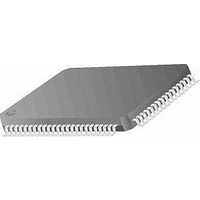MC9S12E64CFU Freescale Semiconductor, MC9S12E64CFU Datasheet - Page 494

MC9S12E64CFU
Manufacturer Part Number
MC9S12E64CFU
Description
IC MCU 64K FLASH 25MHZ 80-QFP
Manufacturer
Freescale Semiconductor
Series
HCS12r
Specifications of MC9S12E64CFU
Core Processor
HCS12
Core Size
16-Bit
Speed
25MHz
Connectivity
EBI/EMI, I²C, SCI, SPI
Peripherals
POR, PWM, WDT
Number Of I /o
60
Program Memory Size
64KB (64K x 8)
Program Memory Type
FLASH
Ram Size
4K x 8
Voltage - Supply (vcc/vdd)
2.35 V ~ 2.75 V
Data Converters
A/D 16x10b; D/A 2x8b
Oscillator Type
Internal
Operating Temperature
-40°C ~ 85°C
Package / Case
80-QFP
Data Bus Width
16 bit
Data Ram Size
4 KB
Interface Type
SCI, SPI
Maximum Clock Frequency
25 MHz
Number Of Programmable I/os
60
Number Of Timers
16 bit
Maximum Operating Temperature
+ 85 C
Mounting Style
SMD/SMT
Minimum Operating Temperature
- 40 C
On-chip Adc
10 bit
On-chip Dac
8 bit, 2 Channel
For Use With
M68EVB912E128 - BOARD EVAL FOR MC9S12E128/64
Lead Free Status / RoHS Status
Contains lead / RoHS non-compliant
Eeprom Size
-
Lead Free Status / Rohs Status
No RoHS Version Available
Available stocks
Company
Part Number
Manufacturer
Quantity
Price
Company:
Part Number:
MC9S12E64CFU
Manufacturer:
Freescale Semiconductor
Quantity:
10 000
Company:
Part Number:
MC9S12E64CFUE
Manufacturer:
Freescale Semiconductor
Quantity:
10 000
Part Number:
MC9S12E64CFUE
Manufacturer:
FREESCALE
Quantity:
20 000
Company:
Part Number:
MC9S12E64CFUER
Manufacturer:
Freescale Semiconductor
Quantity:
10 000
- Current page: 494 of 606
- Download datasheet (4Mb)
Chapter 16 Debug Module (DBGV1)
The breakpoint can operate in dual address mode or full breakpoint mode. Each of these modes is
discussed in the subsections below.
16.4.1.1
When dual address mode is enabled, two address breakpoints can be set. Each breakpoint can cause the
system to enter background debug mode or to initiate a software interrupt based upon the state of BDM in
DBGC2 being logic 1 or logic 0, respectively. BDM requests have a higher priority than SWI requests. No
data breakpoints are allowed in this mode.
TAGAB in DBGC2 selects whether the breakpoint mode is forced or tagged. The BKxMBH:L bits in
DBGC3 select whether or not the breakpoint is matched exactly or is a range breakpoint. They also select
whether the address is matched on the high byte, low byte, both bytes, and/or memory expansion. The
RWx and RWxEN bits in DBGC3 select whether the type of bus cycle to match is a read, write, or
read/write when performing forced breakpoints.
16.4.1.2
Full breakpoint mode requires a match on address and data for a breakpoint to occur. Upon a successful
match, the system will enter background debug mode or initiate a software interrupt based upon the state
of BDM in DBGC2 being logic 1 or logic 0, respectively. BDM requests have a higher priority than SWI
requests. R/W matches are also allowed in this mode.
TAGAB in DBGC2 selects whether the breakpoint mode is forced or tagged. When TAGAB is set in
DBGC2, only addresses are compared and data is ignored. The BKAMBH:L bits in DBGC3 select
whether or not the breakpoint is matched exactly, is a range breakpoint, or is in page space. The
BKBMBH:L bits in DBGC3 select whether the data is matched on the high byte, low byte, or both bytes.
RWA and RWAEN bits in DBGC2 select whether the type of bus cycle to match is a read or a write when
performing forced breakpoints. RWB and RWBEN bits in DBGC2 are not used in full breakpoint mode.
16.4.1.3
Breakpoint operation is first determined by the state of the BDM module. If the BDM module is already
active, meaning the CPU is executing out of BDM firmware, breakpoints are not allowed. In addition,
while executing a BDM TRACE command, tagging into BDM is not allowed. If BDM is not active, the
breakpoint will give priority to BDM requests over SWI requests. This condition applies to both forced
and tagged breakpoints.
In all cases, BDM related breakpoints will have priority over those generated by the Breakpoint sub-block.
This priority includes breakpoints enabled by the TAGLO and TAGHI external pins of the system that
interface with the BDM directly and whose signal information passes through and is used by the
breakpoint sub-block.
494
Dual Address Mode
Full Breakpoint Mode
Breakpoint Priority
The full trigger mode is designed to be used for either a word access or a
byte access, but not both at the same time. Confusing trigger operation
(seemingly false triggers or no trigger) can occur if the trigger address
occurs in the user program as both byte and word accesses.
MC9S12E128 Data Sheet, Rev. 1.07
NOTE
Freescale Semiconductor
Related parts for MC9S12E64CFU
Image
Part Number
Description
Manufacturer
Datasheet
Request
R
Part Number:
Description:
Manufacturer:
Freescale Semiconductor, Inc
Datasheet:
Part Number:
Description:
Manufacturer:
Freescale Semiconductor, Inc
Datasheet:
Part Number:
Description:
Manufacturer:
Freescale Semiconductor, Inc
Datasheet:
Part Number:
Description:
Manufacturer:
Freescale Semiconductor, Inc
Datasheet:
Part Number:
Description:
Manufacturer:
Freescale Semiconductor, Inc
Datasheet:
Part Number:
Description:
Manufacturer:
Freescale Semiconductor, Inc
Datasheet:
Part Number:
Description:
Manufacturer:
Freescale Semiconductor, Inc
Datasheet:
Part Number:
Description:
Manufacturer:
Freescale Semiconductor, Inc
Datasheet:
Part Number:
Description:
Manufacturer:
Freescale Semiconductor, Inc
Datasheet:
Part Number:
Description:
Manufacturer:
Freescale Semiconductor, Inc
Datasheet:
Part Number:
Description:
Manufacturer:
Freescale Semiconductor, Inc
Datasheet:
Part Number:
Description:
Manufacturer:
Freescale Semiconductor, Inc
Datasheet:
Part Number:
Description:
Manufacturer:
Freescale Semiconductor, Inc
Datasheet:
Part Number:
Description:
Manufacturer:
Freescale Semiconductor, Inc
Datasheet:
Part Number:
Description:
Manufacturer:
Freescale Semiconductor, Inc
Datasheet:











